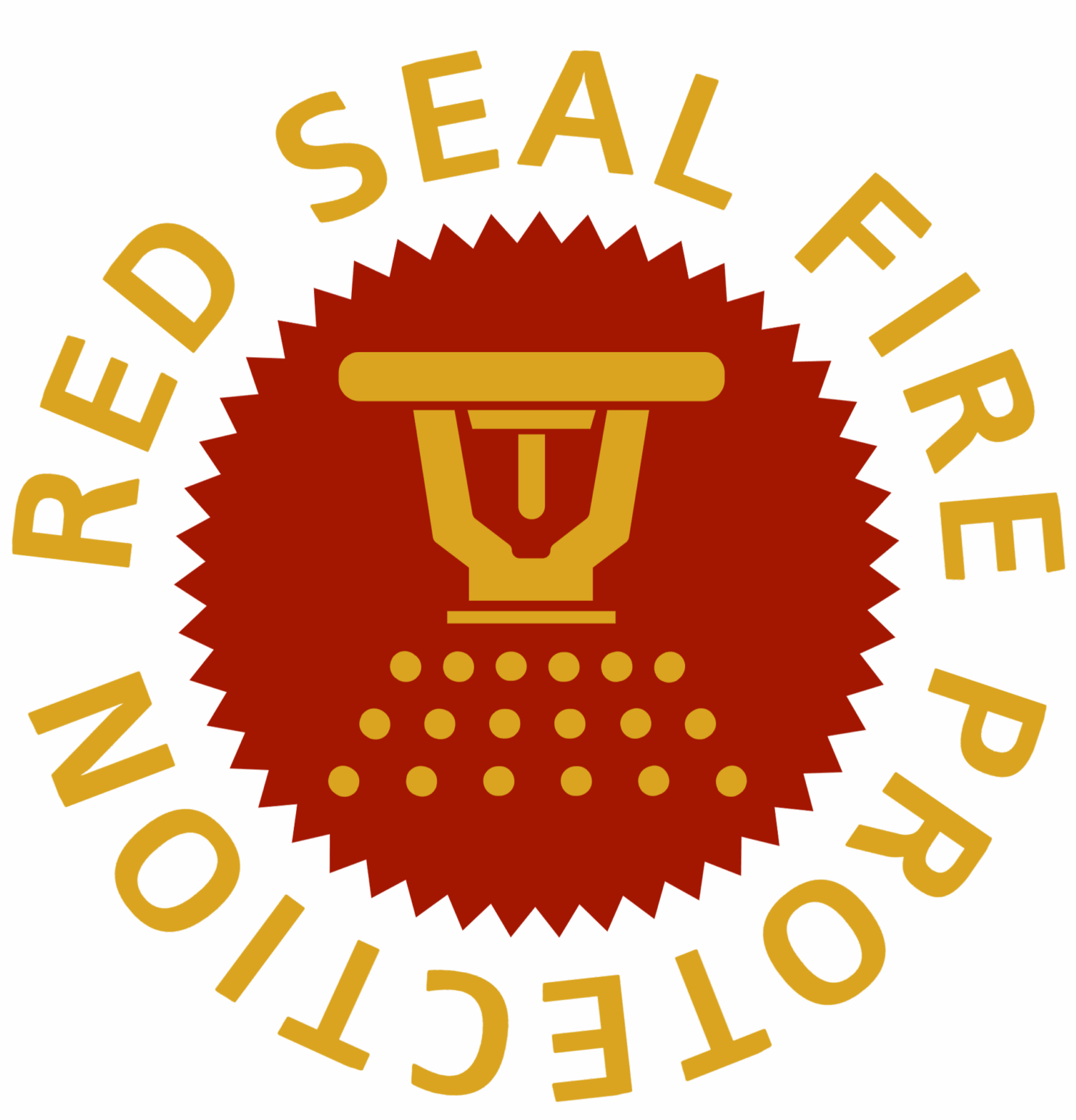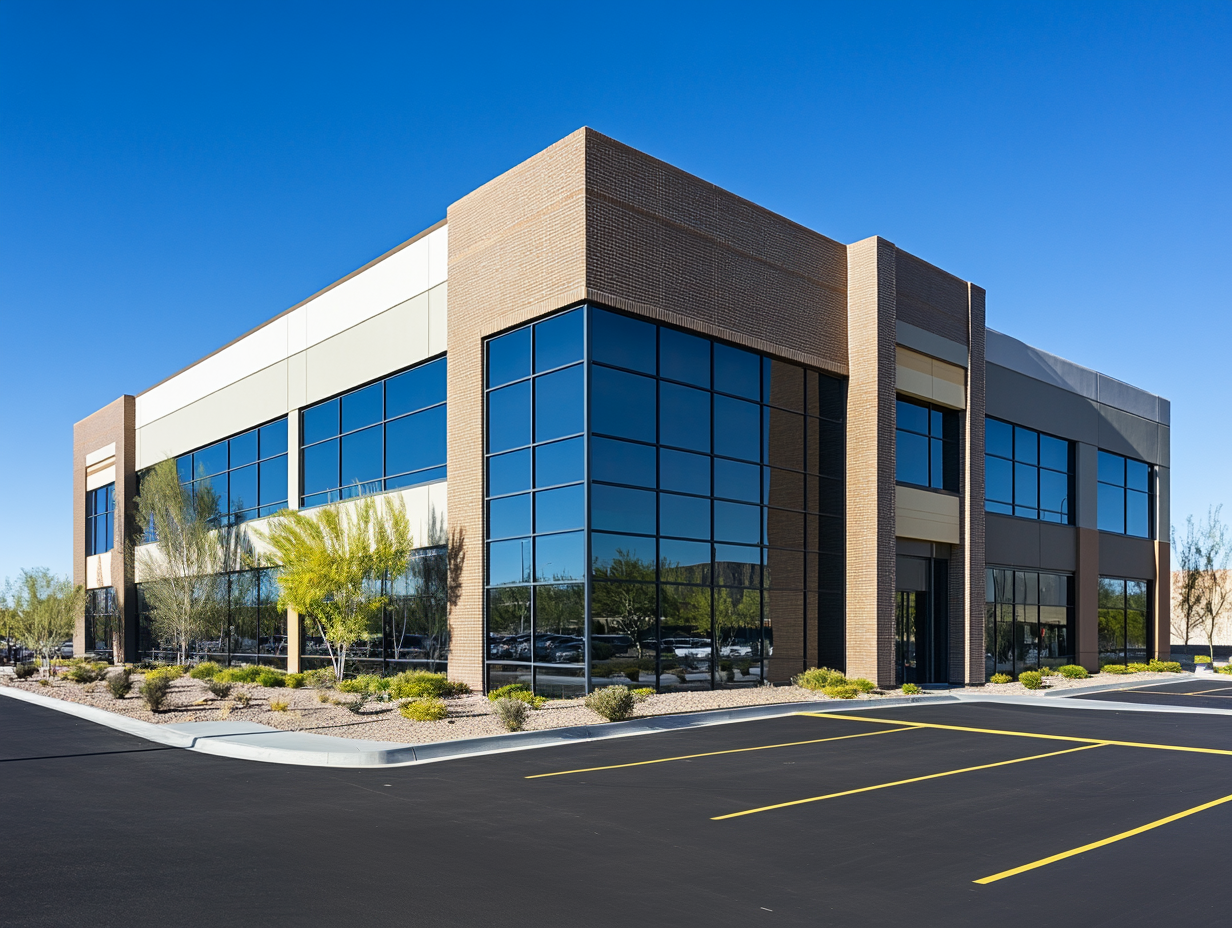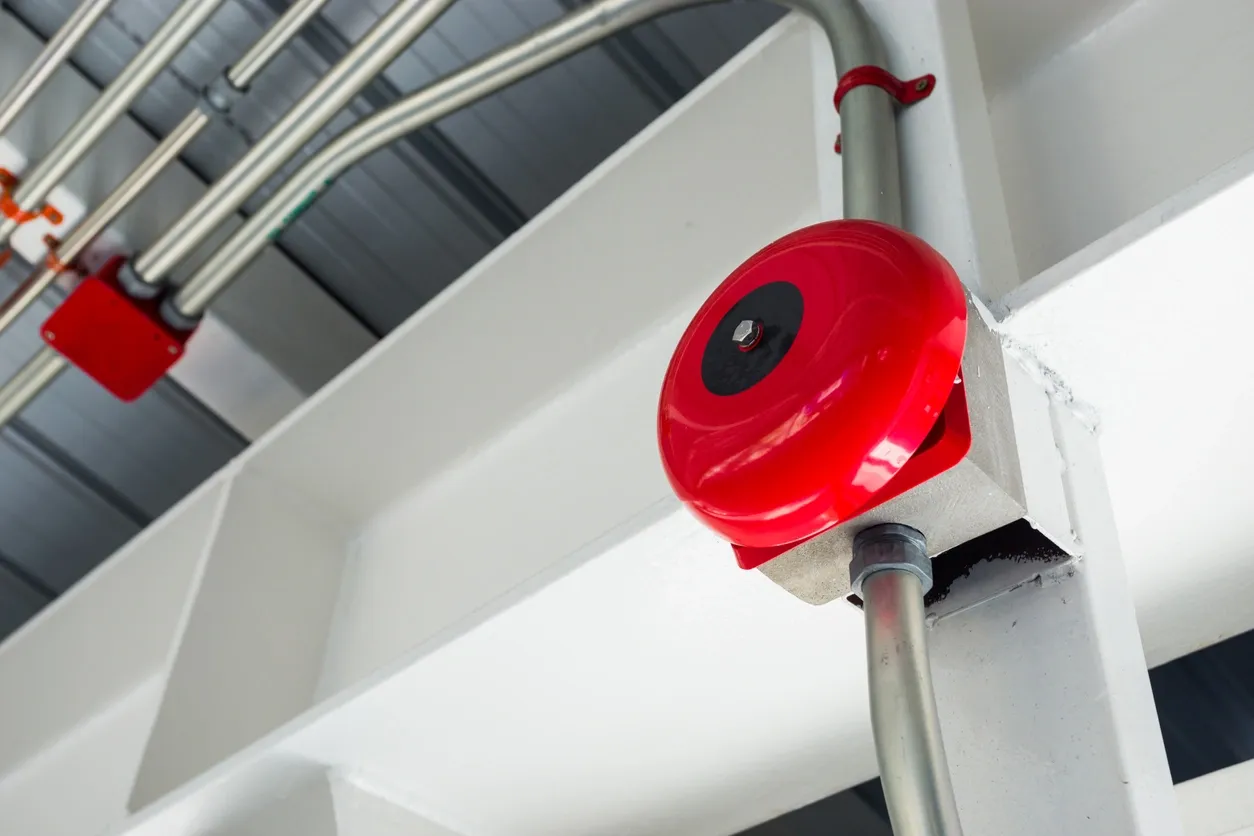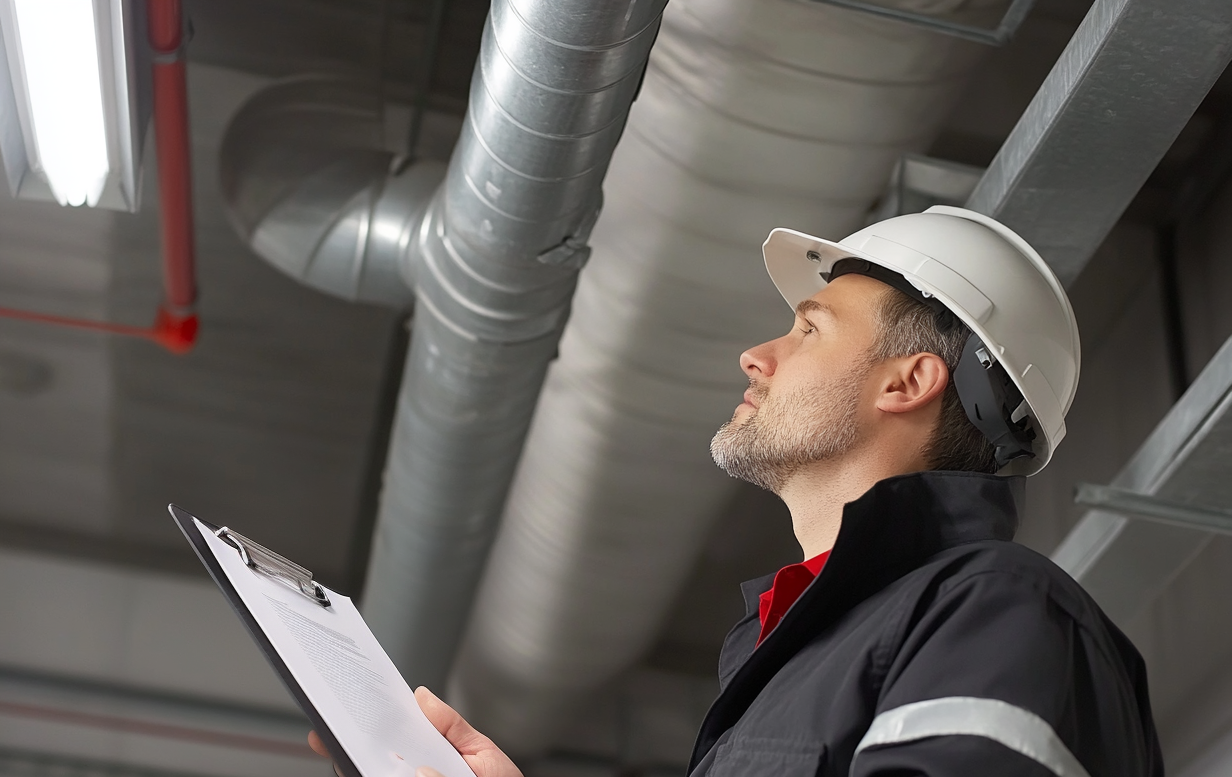For business owners and property managers, understanding the costs associated with commercial fire sprinkler system installation represents a crucial aspect of property protection and safety compliance. As Ontario’s commercial building landscape grows, grasping these expenses helps in making informed decisions about fire safety investments. The increasing complexity of modern commercial spaces makes this knowledge more valuable than ever for strategic planning and budgeting.
Understanding Commercial Fire Sprinkler Systems
Commercial System Types and Applications
Commercial fire sprinkler systems come in several variations, each designed for specific business environments:
- Wet pipe systems remain the most popular choice for standard commercial spaces, offering reliable protection with water-filled pipes ready for immediate response
- Dry pipe systems suit unheated areas or facilities where freezing poses a risk
- Pre-action systems protect sensitive environments like data centers and electronics facilities
- Deluge systems serve high-hazard industrial areas requiring immediate, widespread suppression
Modern technological advancements have introduced smart monitoring capabilities to these systems, allowing for real-time status updates and predictive maintenance scheduling.
Ontario Building Code Requirements
The Ontario Building Code mandates specific requirements for commercial fire sprinkler systems based on:
- Building height and square footage
- Occupancy type and classification
- Storage or manufacturing of hazardous materials
- Building renovation status and historical designations
Meeting these requirements forms the baseline for any installation cost consideration. Regular updates to building codes mean businesses must stay informed about changing compliance standards and potential retrofit requirements.
Factors That Impact Commercial Installation Costs
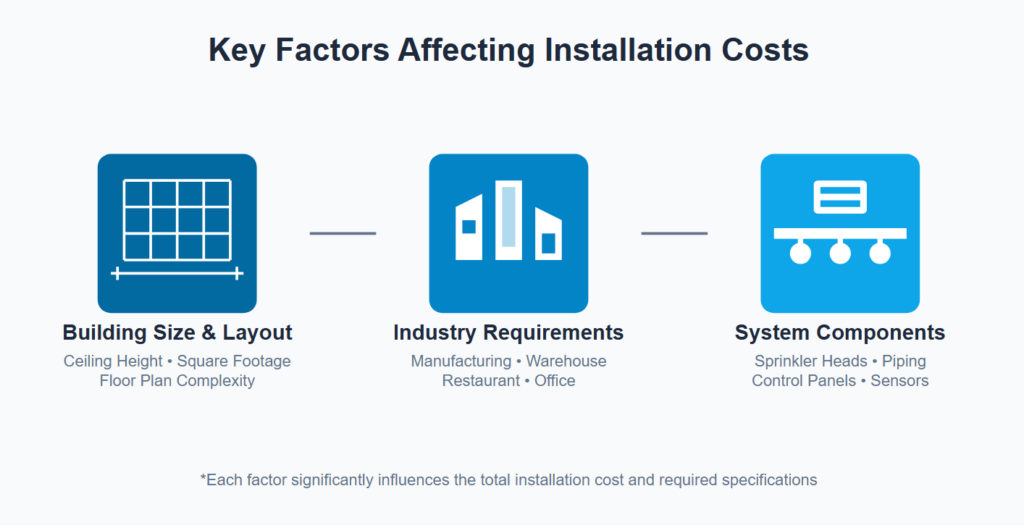
Building Size and Layout Analysis
Square footage directly influences system costs, but several layout factors affect the final price:
- Ceiling height and configuration
- Distance between sprinkler heads
- Accessibility of water supply
- Presence of existing infrastructure
- Complexity of floor plans
Advanced 3D modelling technology now aids in precise system design, helping optimize coverage while minimizing installation costs.
Industry-Specific Requirements
Different commercial sectors demand varying levels of protection:
- Manufacturing facilities often need specialized chemical suppression systems
- Warehouses require systems capable of reaching high storage areas
- Restaurants need specific kitchen suppression solutions
- Office buildings typically use standard commercial configurations
Each industry also faces unique challenges regarding system maintenance and regulatory compliance, which should factor into initial design decisions.
System Components and Materials
Quality and quantity of materials significantly impact overall costs:
- Sprinkler heads and their specific ratings
- Piping materials and size requirements
- Control panels and monitoring systems
- Backup power supplies
- Water flow sensors and alarms
Recent innovations in corrosion-resistant materials have extended system longevity while reducing long-term maintenance costs.
Commercial Installation Cost Breakdown
Labour and Professional Installation
Professional installation services typically account for 40-60% of total costs, including:
- Engineering and design services
- Project management
- Skilled technician labour
- System testing and certification
- Initial training for facility staff
The growing demand for qualified installers has led to an increased emphasis on professional certification programs and specialized training.
Industrial-Grade Equipment and Materials
Equipment costs vary based on system complexity:
- Basic wet pipe systems: $2-4 per square foot for materials
- Dry pipe systems: $3-6 per square foot for materials
- Pre-action systems: $4-7 per square foot for materials
- Control panels: $2,000-5,000 per unit
- Sprinkler heads: $20-100 per unit depending on type
Supply chain improvements and bulk purchasing agreements can often lead to significant cost savings on major system components.
Commercial Permits and Inspections
Regulatory compliance adds necessary costs:
- Building permits
- Fire marshal inspections
- System certification
- Documentation and compliance paperwork
- Local authority approvals
Digital documentation systems have streamlined the permit application and inspection processes in many jurisdictions.
Return on Investment for Businesses
Commercial Insurance Benefits
Installing approved fire sprinkler systems often leads to significant insurance advantages:
- Premium reductions ranging from 25-60%
- Lower liability coverage costs
- Reduced business interruption insurance rates
- Better overall coverage terms
Insurance providers increasingly offer additional incentives for businesses that implement advanced fire protection measures beyond minimum requirements.
Asset Protection Value
Beyond insurance benefits, sprinkler systems protect valuable business assets:
- Inventory and equipment protection
- Reduced downtime after fire incidents
- Preservation of business records
- Protection of intellectual property
Maintenance and Inspection Requirements
Long-term cost considerations include:
- Quarterly professional inspections
- Annual comprehensive testing
- Component replacement schedules
- System updates and upgrades
- Emergency service contracts
Preventive maintenance programs have proven to reduce system failures and extend equipment lifespan significantly.
Selecting a Commercial Fire Protection Contractor
Professional Certifications
Look for contractors with proper credentials:
- NFPA certifications
- Provincial licenses
- Insurance coverage
- Safety compliance records
- Industry association memberships
Ongoing professional development requirements ensure contractors stay current with evolving industry standards and technologies.
Commercial Project Experience
Evaluate potential contractors based on:
- Years of commercial installation experience
- Portfolio of similar projects
- References from comparable businesses
- Knowledge of local codes and requirements
- Emergency response capabilities
Partnership agreements with equipment manufacturers often indicate a contractor’s commitment to quality installation practices.
Common Questions About Commercial Sprinkler Installation Costs
Q: What factors most affect the total installation cost?
A: Building size, system type, and local code requirements typically have the largest impact on installation costs. A standard commercial system often ranges from $5-12 per square foot installed.
Q: When should installations be planned during construction?
A: Early planning during the design phase offers the most cost-effective installation. Retrofitting existing buildings typically costs 20-35% more than new construction installation.
Q: What ongoing costs should businesses anticipate?
A: Annual maintenance costs typically range from $0.15-0.25 per square foot, covering regular inspections, testing, and minor repairs.
Q: Are there tax benefits for system installation?
A: Many jurisdictions offer tax deductions or credits for fire safety improvements. Consult with tax professionals about current incentives and depreciation schedules.
Q: How long does installation typically take?
A: Installation timeframes vary by project size but generally range from 2-8 weeks for most commercial properties, depending on complexity and square footage.
Making Your Fire Protection Investment Count
Commercial fire sprinkler system installation represents a vital investment in your business’s future. While costs vary based on your specific needs, the long-term benefits of professional installation far outweigh the initial investment.
Red Seal Fire Protection brings decades of experience serving Ontario businesses across Windsor-Essex County and Chatham-Kent. Our certified team specializes in custom solutions that match your building’s requirements and budget while meeting all Ontario Building Code standards. Contact Red Seal Fire Protection today for a detailed cost assessment of your commercial property’s fire sprinkler system needs. Our experts will guide you through the installation process, ensuring your business receives the highest standard of fire protection.
